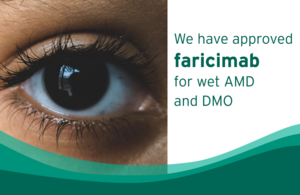MHRA approves faricimab through international work-sharing initiative
It is the first treatment approved by the UK regulator that has been made possible through the Access Consortium ‘New Active Substance Work Sharing Initiative’.

Faricimab, a new medicine for people with the progressive eye diseases wet age-related macular degeneration (wet AMD) and visual impairment due to diabetic macular oedema (DMO), has been approved by the Medicines and Healthcare products Regulatory Agency (MHRA).
It is the first treatment approved by the UK regulator that has been made possible through the Access Consortium ‘New Active Substance Work Sharing Initiative’ – a collaboration of regulatory authorities including the United Kingdom, Australia, Canada, Singapore, and Switzerland. The consortium’s goal is to maximise international co-operation between partners, reduce duplication, and increase each agency’s capacity to ensure patients have timely access to high quality, safe and effective therapeutic products. The MHRA joined the Consortium in October 2020.
Faricimab (Vabysmo), an eye injection made by Roche Products Limited, is a bispecific antibody designed to block two different pathways implicated in causing vision loss in patients with wet AMD and DMO. The treatment has been shown to be effective in improving vision or reducing vision loss in these patient groups but has the added benefit in that it can be given less frequently in selected patients than other medicines currently available.
Dr June Raine, Chief Executive, Medicines and Healthcare products Regulatory Agency said:
We are pleased to work alongside other international regulators in the Access Consortium, which allows us to provide faster access to safe and effective medicines for all our populations, including those in the UK.
Neovascular age-related macular degeneration and diabetic macular oedema are two leading causes of vision loss. This approval highlights the significant benefit to patients in communication, collaboration and innovation with our international peers. We look forward to working together with international regulators on our shared goals of patient safety and access to new treatments.
Sajid Javid, Health and Social Care Secretary said:
It is fantastic news the MHRA has approved faricimab, a highly effective treatment for reducing loss of vision, as we continue to approve game-changing medicines for use in the UK.
Now we have left the EU, the UK is free to team up with other world-leading regulators to speed up the approval process for medicines, while maintaining the highest safety standards – and this is a great example of UK patients getting quicker access to cutting-edge treatments.
Cathy Yelf, Chief Executive of leading sight loss charity the Macular Society, said:
Patients with wet age-related macular degeneration and diabetic macular oedema face the burden of regular hospital visits to receive the vital treatment they need to save their sight. However, we know these trips can be arduous and often rely on the support of friends and family, sometimes as often as every four weeks.
We are delighted that a new treatment option, which has the potential to maintain vision and help minimise the number of hospital visits and will make a real difference to the lives of many people living with this devastating condition, has been approved by the MHRA.
It is for National Institute for Health Excellence (NICE) and Scottish Medicines Consortium (SMC) to advise in due course on whether faricimab will be available on the NHS.
Notes to Editor
- Medicines and Healthcare products Regulatory Agency (MHRA) is responsible for regulating all medicines and medical devices in the UK by ensuring they work and are acceptably safe. All our work is underpinned by robust and fact-based judgements to ensure that the benefits justify any risks.
- The MHRA is an executive agency of the Department of Health and Social Care.
- The MHRA is part of the Access Consortium along with the Therapeutic Goods Administration, Health Canada, Health Sciences Authority of Singapore and Swissmedic.